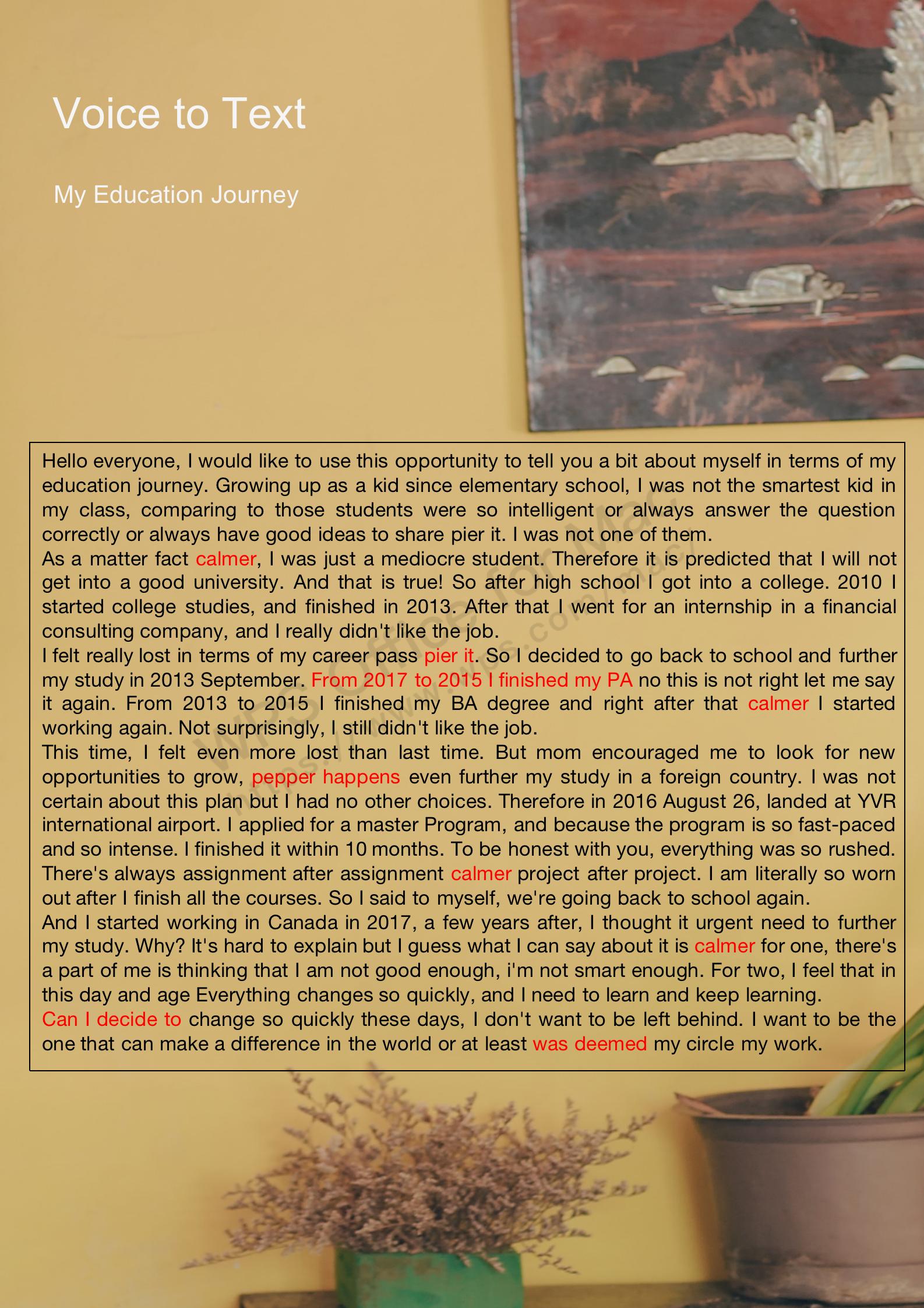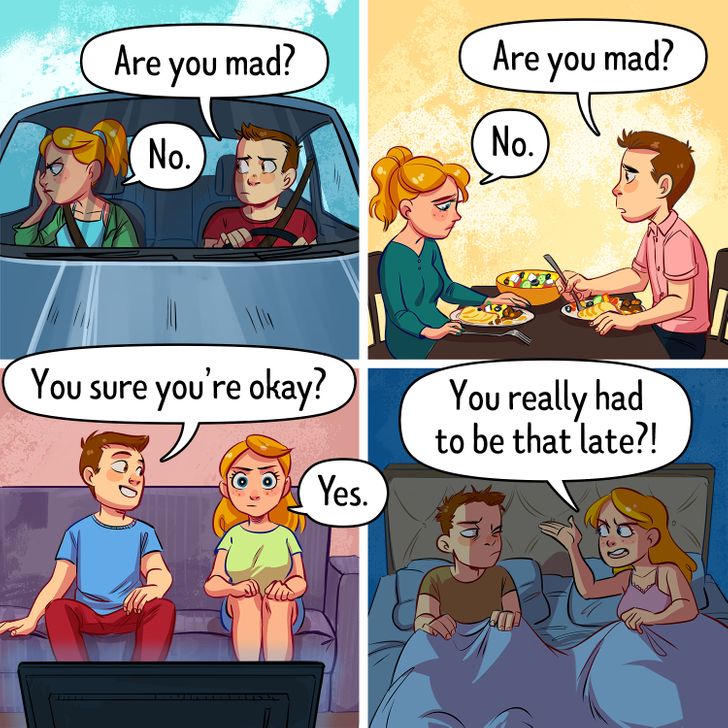
Q1. How does the text deviate from conventions of written English?
Comparing to written English which heavily involves reading and writing, the oral text involves more listening and speaking. As a result, the oral text is considered informal and simple than the written format. For example, speakers can use “I wanna” “gotta” “gonna” in a conversation. Whereas, written language has to be grammatically correct and formal.
In oral communication, one can hear more “text” through the speakers’ tone, volume, and pitch. A person can say “I am so excited to see you” with great excitement or sarcasm. In written text, the reader needs to know the context of a conversation, and then make a judgment of what has been said is with certain kinds of emotions or feelings. In written English, writers need to communicate with their audiences through the use of adjectives and adverbs. For instance, “she joyfully said, I am so excited to see you” or “she was unpleasantly surprised. After a moment, she can only manage to say, I am so excited to see you.”
The picture perfectly demonstrates text is beyond the message itself, the literal meaning of a sentence may not fully reflect one’s emotions or feelings.

Image 1. retrieve from Bright Side
In situations where you find the text is ambiguous no matter in oral format or in written format, ask questions to clarify. How does that make you feel? Are you happy or sad? Is there any clarification I can provide?
Q2. What is “wrong” in the text? What is “right”?
The majority of the oral text is interpreted correctly, except for some mistakes about numbers, punctuation marks, and spelling issues. These mistakes can create confusion, and sometimes even turn the conversation in a totally different direction, good intentions could be interpreted as bad or with ambiguity. For example, I said “from 2015 to 2017 I finished my BA”, but the machine reads it as “from 2017 to 2015 I finished my PA”.
Meanwhile, Speechnotes cannot precisely interpret words with similar pronunciation, it interprets comma to “calmer”, period to “pier it”, perhaps to “pepper happens”. If I am reading this voice-to-text message, I am definitely lost.
How many of you prefer text to voice message?
If a friend of yours sent you three one-minute-long voice messages on iMessage, how does that make you feel? Personally, I prefer text messages to voice messages. Written text messages are more concise and well put together. It will only take a few seconds to read it, while a voice message will take however long it is to hear. If you are in favor of voice messages, can you explain why?
Q3. What are the most common “mistakes” in the text and why do you consider them “mistakes”?
The most common mistake is punctuation marks in oral text. As a matter of fact, there are no punctuation marks in oral communication at all which makes it even more difficult to understand the text.
Without comma: I found John an experienced doctor. (John is an experienced doctor).
With comma: I found John, an experienced doctor. (I found an experienced doctor for John).
These two sentences have exactly the same words, but without proper punctuation, they can mean differently.
Q4. What if you had “scripted” the story? What difference might that have made?
Human beings are forgetful, especially at this information overload date and age. Our ancestors first created graphic symbols, and then artworks and spoken language, later on, written languages to preserve their culture (Schmandt-Besserat, 2009). So, we can understand our origins and history. Stepping on their shoulders, we prosper and grow beyond them.
On every public speaking occasion, I always make sure I have a script or at least some bullet points to remind me of the keynotes. My iPhone notebook is filled with memos, my outlook email is marked with to-do items, and I have to use the calendar to remind me of the deadlines and appointments.
If I have written down the story, I would be able to give detailed information about the story, such as significant incidents, people involved in this story, date, date and time, etc. On top of that, writing allows more time to think carefully and process information logically. Often times in oral communication, people would let the conversation flow, and it may lead to other topics and end up agreement or disagreement.
Q5. In what ways does oral storytelling differ from written storytelling?
Stand-up comedy is an excellent example of oral storytelling. On BBC’s show called The Marvellous Mrs. Maisel. Even Mrs. Maisel revealed that she has to write down notes and storylines to ensure her stand-up comedy is well thought through.
An example of written storytelling is The Old Man and the Sea by Ernest Hemingway which tells a story of an old Cuban fisherman who survived the extremest weather in the sea, battle with a giant marlin, and returned to shore safely (Wikipedia, 2021). This book was written in 1951, and published in 1952 which means this story has been alive for almost 70 years.
The same idea could be applied to other written languages tracing back to about 1200 to 165 BC when the Old Testament was written in Hebrew. Centuries later, we can still enjoy this timeless written treasure in more than a hundred languages. Thus, it is certain to say written language enjoys more longevity than oral language.
References
Schmandt-Besserat, D. (2009). “Origins and Forms of Writing.” In Bazerman, C. (Ed.). Handbook of research on writing: History, society, school, individual, text. New York, NY: Routledge.
Wikipedia contributors. (2021, August 4). The Old Man and the Sea. In Wikipedia, The Free Encyclopedia. Retrieved 00:24, September 27, 2021, from https://en.wikipedia.org/w/index.php?title=The_Old_Man_and_the_Sea&oldid=1037163690.
nataliia kudryk
September 27, 2021 — 9:46 pm
Hello Vera,
Thank you for your question.
My best friends and I have a group in Messanger on Facebook. We used to only send text messages to each other using this app but a couple of days ago we have discovered the “dictate” feature that has always been there and started using it 🙂
I love it for a number of reasons: you can hear each others’ tone of voice and there is no written evidence of what has been said (which can be an advantage and disadvantage). Sometimes people pick each other’s words apart when they are in a written form or tend to misinterpret them. Also, I like the fact that you can just listen to the messages while you are driving or doing other activities and not necessarily have to read them all. It is quite convenient.